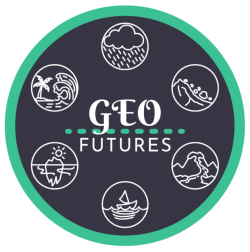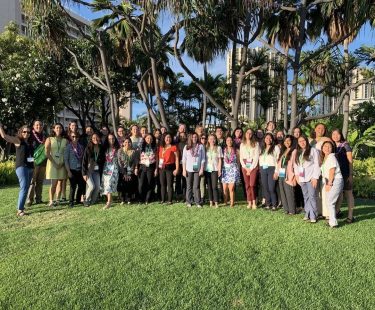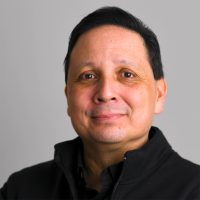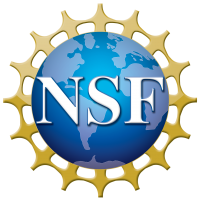 Geo-Futures is a conference-based program funded by the National Science Foundation (NSF) that engages with, and provides educational resources for, students interested in pursuing a career in the geosciences (Atmospheric, Earth, Ocean, and Polar Science). Set within the National Diversity in STEM (NDiSTEM) conference of the Society for Advancement of Chicanos/Hispanics and Native Americans in Science (SACNAS), a national society that engages with the cultural structures of students from underrepresented groups, the proposed program employs strategies for engaging and retaining the diverse assemblage of students and perspectives that will be required to address the emerging needs of 21st century geoscience.
Geo-Futures is a conference-based program funded by the National Science Foundation (NSF) that engages with, and provides educational resources for, students interested in pursuing a career in the geosciences (Atmospheric, Earth, Ocean, and Polar Science). Set within the National Diversity in STEM (NDiSTEM) conference of the Society for Advancement of Chicanos/Hispanics and Native Americans in Science (SACNAS), a national society that engages with the cultural structures of students from underrepresented groups, the proposed program employs strategies for engaging and retaining the diverse assemblage of students and perspectives that will be required to address the emerging needs of 21st century geoscience.

The Geo-Futures program provides participants with mentoring before, during, and after their experience at SACNAS, and helps them develop a sense of identity and community within the geosciences. Geo-Futures will also assist students as they begin to define their academic and professional pathways through the geosciences, while providing pre- and post-conference training around understanding how to engage in a national research conference. These activities include an introduction to navigating a scientific conference and networking with geoscientists during the event. A technology microcredential workshop, focused on applications to the geosciences, offered at the SACNAS conference in collaboration with the Marine Technology Society, the American Geophysical Union and the National Oceanic and Atmospheric Administration. The SACNAS conference will provide students with an introduction to original research being conducted in the geosciences as well as examples of career pathways that can be engaged in as a professional geoscientist. Beyond providing students with guidance on how to pursue academic and professional careers in the geosciences, the SACNAS Geo-Futures program helps students understand how their diverse talents and perspectives can contribute to 21st century geoscience research. 2024 applications are open now.
Note: Students with REU or REU-type experiences in the geosciences are especially encouraged to apply.
For additional information, please contact us at [email protected].
Student support
- Funding to attend the 2024 SACNAS NDiSTEM Conference
- Pre- and post-conference professional development workshops
- Mentorship and networking opportunities
Eligibility requirements
- U.S. Citizen or Permanent Resident
- Must be an undergraduate student currently enrolled in a two- or four-year institution
- Majoring in a STEM discipline related to the geosciences (Atmospheric, Earth, Ocean, Polar Science)
- Must have submitted a research presentation abstract to the SACNAS 2024 National Diversity in STEM Conference
Application
The 2024 NSF Geo-Futures Program application is now available through Wednesday, Aug 21, 2024, 11:59pm PDT. There will be three types of attachments required and all parts must be completed for an applicant to be considered.
Application Form
Application deadline is Wednesday, Aug 21, 2024, 11:59pm PDT.
This form asks for Applicant Information, Mentor Preferences, and Academic Background. You will also need to have your supporting documents ready to upload at the time of submittal. If you need to submit an application by mail, please contact [email protected], and we will provide instructions for you.
Part 1: Contact information for one reference
At the time of submission, your application requires contact information for one person who can assess your academic abilities, academic accomplishments and motivation, work habits, potential as a researcher, and your potential to benefit from participating in this program. Upon consideration of your acceptance to the program, we may contact your reference for a letter of recommendation.
Part 2: Proof of abstract submission to the 2024 SACNAS conference
- Copy of email confirmation that your abstract was submitted to SACNAS by the conference’s abstract deadline
- Copy of the abstract itself, including the title.
Part 3: Supporting Documents
You will need three key documents to support your application:
- Statement of Purpose
- This essay covers four areas: Motivation, Achievement, Research Interests and Career Goals.
- Format: 2 pages maximum, 12-pt font, standard margins, single or double spacing will be accepted and is up to the applicant
- Use the following questions for further guidance:
- Describe the areas of research in the geosciences that interest you most, your personal goals for this program, and indicate your preference for working in office, lab, or field settings.
- Write about what your career goals are and how participating in this program will help you meet these goals.
- What unique qualities and characteristics will you bring to the NSF Geo-Futures program?
- The NSF Geo-Futures program is dedicated to enhancing the diversity of future scientific communities and sharing our science with a broader audience. Please describe how you, based on your personal background and life experiences (including social, cultural, familial, educational, or other opportunities or challenges) will contribute to this mission during and after participation in this program.
- College Transcripts (unofficial or “released to student” version is fine!)
- CV/Academic Resume (2 pages maximum)
Interested in serving as a mentor in the program?
We are now requesting volunteers to serve as mentors for our 2024 Geo-Futures cohort. A strong student-faculty mentor relationship is paramount for the success of Geo-Futures students. Mentors must be in attendance at the 2024 SACNAS National Diversity in STEM Conference in Phoenix, Arizona, October 30-November 02 2024.
Funding is provided by the National Science Foundation’s Division of Research, Innovation, Synergies, and Education, Grant #2433487
Dean's Office Contacts:

Anastasia Schemkes
Diversity Equity Inclusion (DEI) Program Specialist



